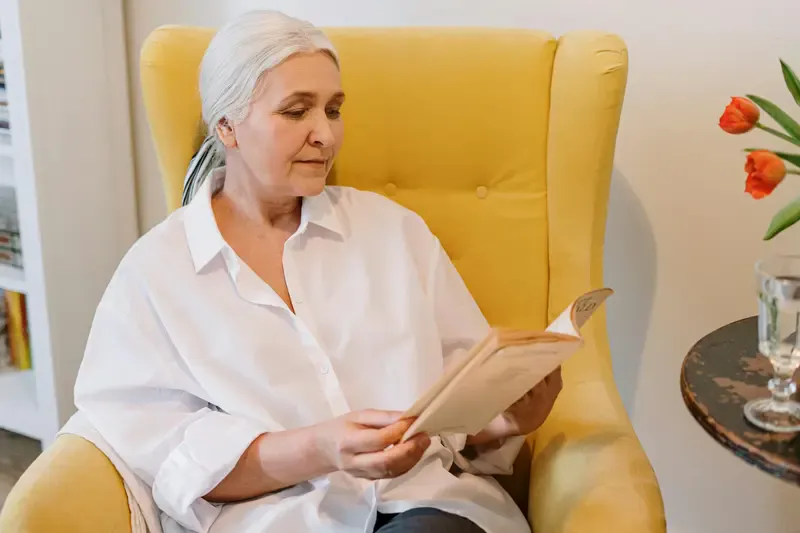Mrs. Johnson has five children who call weekly, attends senior center activities, and lives in a friendly neighborhood. Yet she feels profoundly alone. The problem isn't lack of contact—it's lack of genuine connection. Here's how real conversations can change everything.
When Being Surrounded by People Still Feels Lonely
Margaret has three children who visit regularly, attends weekly activities at the senior center, and has friendly neighbors who wave hello. Yet she describes feeling 'invisible' and 'like no one really sees me anymore.' Sound familiar? This is the reality for millions of older adults who have plenty of contact but little genuine connection.
Senior loneliness isn't always about being physically alone. It's about feeling unheard, unseen, and disconnected from meaningful human contact. Research shows that nearly half of adults over 65 experience chronic loneliness, with health impacts comparable to smoking. But here's what's encouraging: the solution often isn't complex programs or dramatic interventions. Sometimes it's as simple as someone taking the time to really listen.
Why Surface-Level Interactions Leave Seniors Feeling Empty
Think about the typical interactions many seniors have with family and caregivers. The conversations often center around practical needs: How are you feeling? Did you take your medication? Do you need anything from the store? These interactions, while caring, can make seniors feel more like patients than people.
When every conversation focuses on what's wrong or what needs to be fixed, seniors can start feeling like their value lies only in their problems. They begin to sense that people see them as burdens rather than individuals with rich inner lives, decades of experience, and ongoing thoughts and feelings about the world around them.
This is why someone can be surrounded by people yet still feel profoundly alone. They're getting attention for their needs, but not connection for who they are as complete human beings.
The Hidden Impact of Feeling Unheard
When seniors don't feel truly heard, it affects more than just their mood. Studies from Harvard Medical School show that chronic loneliness can impact physical health as much as smoking or obesity. But beyond the statistics, think about what it must feel like to have decades of life experience and wisdom, yet feel like no one is interested in what you have to say.
Many seniors report feeling like the world has moved past them. They have perspectives on current events, thoughts about family dynamics, memories that could provide guidance, and ongoing concerns about the future. When these thoughts and feelings have no outlet, the isolation becomes profound.
The tragedy is that this wisdom and perspective is exactly what many younger people could benefit from hearing, if only we created space for these conversations to happen.
What Meaningful Connection Actually Looks Like
Real connection with seniors starts with shifting from caretaking mode to genuine curiosity about their inner world. Instead of 'How are you feeling today?' try 'What's been on your mind lately?' Instead of updating them on your news, ask about their thoughts on current events or what they've been observing about the world.
Listen for the person behind the age. When a senior expresses worry about the future, don't immediately reassure them that everything will be fine. Instead, acknowledge their concern: 'That sounds like something that would weigh on your mind' or 'Tell me more about what worries you about that.'
The most powerful conversations often happen when we ask seniors about their experiences and perspectives rather than their immediate needs. Questions like 'What surprised you most about getting older?' or 'What do you wish more people understood about life?' can open doors to deep, meaningful exchanges.
Creating Safe Spaces for Authentic Sharing
Many seniors carry feelings they don't feel safe sharing with family members. They might worry about burdening their children with fears about aging, or they may feel judged for having regrets or disappointments. This is where anonymous or neutral listening can be particularly valuable.
When seniors can express their real thoughts and feelings without worrying about family dynamics or social expectations, something profound happens. They feel heard as individuals rather than as someone's parent or patient. They can process difficult emotions without feeling like they're creating problems for the people they love.
At LissnUp, we see this transformation regularly. Seniors who felt invisible suddenly feel seen when they have someone who listens without trying to fix, judge, or redirect their feelings.
Small Changes That Make a Big Difference
Combating senior loneliness doesn't require dramatic interventions. Often the most meaningful changes are subtle shifts in how we approach our interactions with older adults.
Next time you're with a senior, try spending less time talking about their health or practical needs and more time asking about their thoughts and experiences. Show genuine curiosity about their perspectives. Ask follow-up questions that demonstrate you're really listening, not just waiting for your turn to talk.
Consider the power of simply saying 'Tell me more about that' when they share something. Many seniors are so used to brief, surface-level interactions that they're surprised when someone actually wants to hear more. This simple phrase can transform a casual exchange into a meaningful conversation.
When Professional Support Helps
While meaningful conversations can significantly impact senior loneliness, it's important to recognize when additional support might be helpful. If a senior expresses persistent hopelessness, talks about not wanting to live, or shows dramatic changes in personality or functioning, these may indicate clinical depression requiring professional evaluation.
Family members and volunteers can provide incredible emotional support through genuine listening, but they don't need to carry the entire burden of someone's emotional wellbeing. Professional counselors, support groups, and services like LissnUp can complement family support by providing additional outlets for processing difficult emotions.
Building a More Connected Community
Addressing senior loneliness is ultimately about recognizing that older adults remain complete human beings with valuable perspectives, ongoing emotional needs, and important contributions to make. They need more than just care—they need to feel valued, heard, and connected to the broader human experience.
This means looking beyond organized activities and structured programs to focus on the quality of human interaction. A five-minute conversation where someone truly listens can be more impactful than an hour of group activities where no real connection occurs.
Every time we choose to engage with a senior as a whole person rather than just someone who needs help, we're contributing to a more connected, compassionate community. And perhaps most importantly, we're modeling the kind of treatment we hope to receive when we reach that stage of life ourselves.





